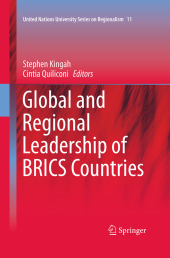 Neuerscheinungen 2016Stand: 2020-02-01 |
Schnellsuche
ISBN/Stichwort/Autor
|
Herderstra▀e 10
10625 Berlin
Tel.: 030 315 714 16
Fax 030 315 714 14
info@buchspektrum.de |

Stephen Kingah, Cintia Quiliconi
(Beteiligte)
Global and Regional Leadership of BRICS Countries
Herausgegeben von Kingah, Stephen; Quiliconi, Cintia
Softcover reprint of the original 1st ed. 2016. 2016. vi, 281 S. 235 mm
Verlag/Jahr: SPRINGER, BERLIN; SPRINGER INTERNATIONAL PUBLISHING 2016
ISBN: 3-319-37021-9 (3319370219)
Neue ISBN: 978-3-319-37021-7 (9783319370217)
Preis und Lieferzeit: Bitte klicken
This book presents a systematic collation of the regional and global dimensions of the leadership role of BRICS countries (Brazil, Russia, India, China and South Africa). It analyses the rising regional and global leadership of BRICS, using specific benchmarks to gauge the nature of this leadership. The elements examined include willingness to lead, the capacity to do as much, and the degree to which the given actor is accepted as a leader both within and beyond its region. The chapters in the book capture the nature of trends in regional and global leadership within the contexts of a changing international order.
It is taken for granted that Brazil, Russia, India, China and South Africa are now engineering a unique pool of governance that is seeking alternatives to the current order of global economic and political affairs. The fact that these countries have jointly decided to forge ahead with the BRICS constellation of states that is now taking consequential decisions such as the creation of the BRICS┤ New Development Bank, is not to be treated lightly. In this book the majority of papers take a step back and systematically analyse the real state of the leadership that is provided by the BRICS on a litany of regionally and globally relevant issues. While no one doubts the fact that these countries have the capacity to provide leadership especially in their various regions on many issues, what remains moot is whether they are willing and capable to do so at the global level. Even in those cases where there is the willingness and capacity, the book argues that the acceptance of such leadership by potential followers is not always a given.
Chapter 1. Introduction: The BRICS in Regional and Global Governance; Stephen Kingah and Cintia Quiliconi.- Chapter 2. Conceptualising Regional Leadership: the Positioning Theory Angle; Luk Van Langenhove, Marieke Zwartjes and Giorgios Papanagnou.- Chapter 3. BRICS: Leadership in the Making; Cintia Quiliconi, Marcelo Saguier and Diana Tussie.- Chapter 4. Brazil┤s Leadership through Global Channels: Autonomy, Diversification and Acceptance; Melisa Deciancio.- Chapter 5. Cooperation for Development, Brazilian Regional Leadership and Global Protagonism; Leticia Pinheiro and Gabrieli Gaio.- Chapter 6. Global Security and Economic Leadership of Russia; Andrei Korobkov, Stephen Kingah and Jovana Jovic.- Chapter 7. Russia┤s Leadership of Regional Integration in Eurasia; Mikhail A. Molchanov.- Chapter 8. India as a Global Power: Capability, Willingness and Acceptance; Golam Robbani.- Chapter 9. Indian Aspirations and South Asian Realities: Perceived Hegemon or Emerging Leader?; Dhananjay Tripathi.- Chapter 10. Leadership with Chinese Characteristics: What Role for Soft Power?; Mark Beeson and Shaomin Xu.- Chapter 11. Complexity of the Relations among Leading States and the Following States: The Case of East Asian Regional Integration; Yong Wang.- Chapter 12. Has south Africa the Spine for Global Leadership?; Stephen Kingah and Stefano degli Uberti.- Chapter 13. South Africa┤s Quest for Leadership in Africa: Achievements, Constraints and DileIntrommas; Mills Soko and Neil Balchin.- Chapter 14. Conclusions: Leadership of the BRICS and Implications for the European Union; Cintia Quiliconi and Stephen Kingah.
"Kingah and Quiliconi sum up the leadership potential of each BRICS member in a precise and informative manner. ... This book would also appeal to scholars of international relations and political science; economists, international finance experts and international lawyers; diplomats and other practitioners; civil society and international/regional NGOs; industry and potential trading partners and interested members of the public. This is the value of accessible and informative writing. If you want to know more about BRICS, read this book." (Narnia Bohler-Muller, South African Journal of International Affairs, Vol. 23 (3), September, 2016)


